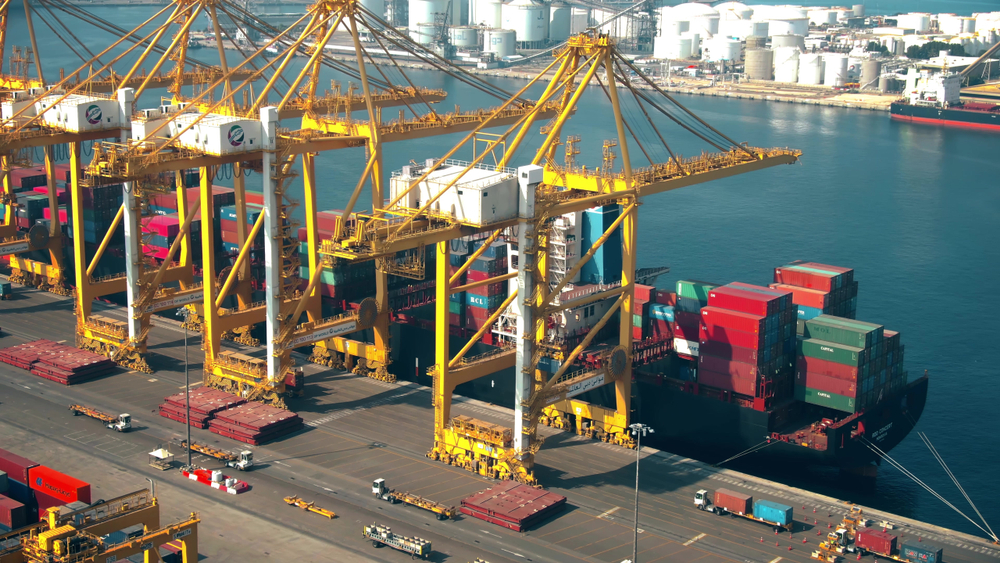Seaports in the Middle East have come to mirror regional interactions. There are many instances of this, in Saudi Arabia, the UAE, Yemen, Syria, Iran, Libya, and Sudan. In Saudi Arabia, the Kingdom’s maritime transport system’s efficiency is being upgraded, with the aim of positioning it as a global leader in the field. In Yemen, the confrontation between Iran and Saudi Arabia continues, with the port of Hodeida receiving Iranian weapons, while the port of Nishtun receives oil supplies from Saudi Arabia. In Syria, there are signs of Russian control over the port of Latakia, following Israeli bombardments alleged to have targeted Iranian weapons stashes, indicating rivalry between Moscow and Tehran. Moreover, strategic partnerships connecting Arab ports are emerging, such as the approval lately by the Iraqi cabinet of an agreement that will create an oil pipeline from the Iraqi port of Basra to the Jordanian port of Aqaba, enhancing the partnership between member states of the New Levant project. It is therefore worth while to examine these developments in further detail, as they will provide indications of future regional trajectories.
Privatization of commercial and industrial ports: Saudi Arabia is seeking investors for eight new multi-purpose stations in commercial and industrial ports in the Kingdom. The Public Ports Authority announced that this was part of a concerted effort to raise the level of service provided to exporters and importers, including container and general cargo services, thereby enhancing the Kingdom’s position as a global logistics hub to achieve the Kingdom’s Vision 2030.
The new strategy, slated for completion by 2030, aims to increase port capacity to more than 40 million TEUs annually, and raise the port occupancy rate to 70% of its total capacity. The strategy also aims to contribute to improving the Kingdom’s international classification in the UNCTAD Maritime Transport Lines Index, to rank 80th, as well as improving Saudi’s ranking in the Logistics Performance Index from 49th to 10th globally. This is in addition to improving Kingdom’s ranking in the Cross-Border Trade Index to 35th globally.
Militarization: Commander of the Joint Forces, Lt Gen Mutlaq bin Salem Al-Azima affirmed during his meeting with field commanders and Arab coalition forces on January 15th, that while Hodeida Port would appear to receive humanitarian and civilian materials and goods, it is in fact receiving weapons and machinery, including missiles and weaponized drones. He added that the port is a launch site for booby-trapped boats and piracy activities, noting the continued of the efforts of the Joint Forces Command and its allies to support the national army to restore Yemeni legitimacy.
The Arab Coalition to Support Legitimacy in Yemen welcomed the United Nations’ move to inspect the port of Hodeida to ensure that it was not used militarily by the Houthis, as stated by UN envoy to Yemen, on January 12th. The coalition called on the United Nations to ensure no flow of foreign fighters and weapons to Hodeida. The United Nations Mission to Support the Hodeida Agreement had confirmed its rejection of the militarization of the ports in the Yemeni city, noting with “great concern” what it described as allegations related to the use of Hodeida for military purposes. The mission stressed that the ports are a lifeline for millions of Yemeni citizens, and appealed to the concerned parties “to resolve this issue, with a commitment to restraint, and to give the highest priority to preserving the civilian character of infrastructure and public facilities, and ensure the protection of ports in the interest of the Yemeni people.”
In parallel, the Arab coalition repeatedly noted that it “will move operationally for self-defense and military necessity should the militarization of the ports continue.” This extends to the port of Saleef as well, where Houthi militia are reported to have tested booby-trapped boats. The Coalition’s claims followed the hijacking of an Emirati cargo ship that was carrying medical equipment, supplies, and aid to the island of Socotra.
A secret report issued by the United Nations in January, also warned that Iran is smuggling weapons to the Houthis under a civilian cover. Most of the weapons are Russian or Chinese manufactured, originating from the Iranian port of Jask on the Gulf of Oman. US fleets and the Saudi navy intercepted several such shipments in 2020 and 2021.
Developmental aid: According to reports by Yemeni news agency, Saba, on January 12th, the sixth batch of the Saudi fuel grant, provided through the Saudi Development and Reconstruction Program for Yemen, designated for operating power plants arrived at the port of Nishtun in Al-Mahrah governorate, Yemen. The shipment amounted to 4,000 metric tons of diesel. Technical teams in Nishtun oil facilities examined the diesel, ensured it meets specifications, and began pumping it to the designated tanks, after which it was distributed to power stations across the governorate’s directorates.
Several shipments of fuel arrived in Aden, Hadramout, and Al-Mahrah over the past period, helping ease the burden and improving services in vital sectors, in areas under government control. The shipments reflect Saudi and Emirati efforts to provide relief and development to the Yemeni people, and the crucial role ports play in this respect.
Competition for control: The port of Latakia in Syria appears to be the subject of competition between Russia and Iran. Following Israeli raids on the port lately, joint patrols by Russian military police and Syrian regular army forces have started, to inspect the port’s yards, warehouses, and operations. Russia was markedly silent regarding the Israeli raids that targeted the port’s container yard in December and appears to be taking advantage of the situation to expel Iran and its affiliated forces and consolidate its control over the port under the pretext of avoiding repeated Israeli air strikes.
This comes two years after Russia asserted its control over the port of Tartus, which is about 19 km from the Russian Hmeimim base, southeast of the city of Latakia. The situation reflects the growing rivalry between allies Russia and Iran in Syria. Syrian media carried reports that Tehran has plans to manage Latakia Port, for which it received approval from Damascus. Iran’s ambassador to Syria, Mahdi Sobhani, in fact met with the governor of Latakia, Amer Ismail Hilal, to discuss developing the port for exports and imports.
New regional blocs: The plan to establish an oil pipeline between Iraq and Jordan was confirmed in a phone call between Jordanian Minister of Energy and Mineral Resources Saleh Al-Kharabsheh and his Iraqi counterpart, Ihsan Abdul-Jabbar, on January 11th. The project comes within the framework of expanding bilateral cooperation, and to serve the common interests of the two countries by opening a new outlet for Iraqi oil exports, according to which Jordan will be granted the right to purchase 150,000 barrels of oil per day to be refined at the oil refinery in the city of Zarqa. The cost of the project is estimated at between USD 7-9 billion dollars, according to Iraqi estimates. The agreement is part of plans agreed upon over 2019-2021 between Egyptian President Abdel Fattah El Sisi, Jordanian King Abdullah bin Al-Hussein, and Iraqi Prime Minister Mustafa Al-Kadhimi.
It is noteworthy that the Abu Dhabi Ports Group signed last December a number of strategic agreements and a memorandum of understanding with the Aqaba Development Company. The agreements aim to contribute to the development of the tourism, transport, logistics, and digital infrastructure sectors in the Jordanian city of Aqaba. The five strategic partnerships relate to the development of the Marsa Zayed area and the cruise ship terminal, an advanced digital system for the port system, the development and modernization of a multi-purpose port, and the modernization and development of King Hussein International Airport in Aqaba.
The above mentioned are perhaps the most prominent examples of how ports are playing a growing role in shaping regional interactions. However, it is clear that while ports can enhance economic opportunities, they can also serve to undermine economic and security interests. Examples of the latter include the closure of Port Sudan, which had extreme and adverse effects on Sudan in the last quarter of 2021, as did the suspension of exports in Sidra and Harouge ports in Libya. Issues related to seaports have become one of the determinants associated with strengthening or weakening the stability and security of regional countries.


